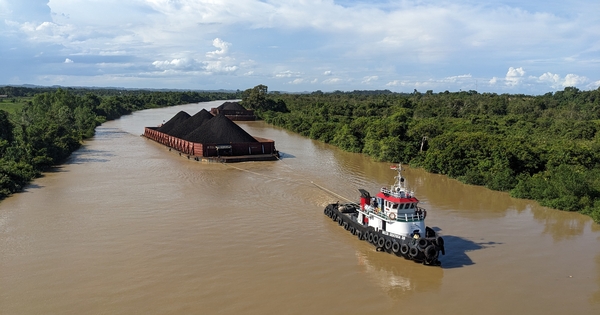Indonesian authorities have launched a sweeping crackdown on mining operations across the resource-rich archipelago, suspending dozens of nickel mines for alleged violations of environmental regulations and operating permits.
The Ministry of Energy and Mineral Resources confirmed yesterday that 51 nickel mining operations in key producing regions have been ordered to halt activities following a series of coordinated inspections. The enforcement action primarily targeted mines in North Maluku and
...
Indonesian authorities have launched a sweeping crackdown on mining operations across the resource-rich archipelago, suspending dozens of nickel mines for alleged violations of environmental regulations and operating permits.
The Ministry of Energy and Mineral Resources confirmed yesterday that 51 nickel mining operations in key producing regions have been ordered to halt activities following a series of coordinated inspections. The enforcement action primarily targeted mines in North Maluku and Central Sulawesi provinces, areas that have seen explosive growth in nickel production over the past five years.
“These suspensions reflect our commitment to responsible resource development,” said Arifin Tasrif, Indonesia’s Minister of Energy and Mineral Resources. “Companies operating in Indonesia must adhere to our environmental standards and licensing requirements without exception.”
According to ministry officials, the suspended operations were found to have committed various infractions, including mining beyond permitted boundaries, inadequate waste management systems, failure to implement required land reclamation programs, and operating without proper environmental impact assessments. Several companies were also cited for improper reporting of production volumes, suggesting possible tax compliance issues.
The enforcement action comes amid Indonesia’s ambitious push to develop its downstream nickel processing industry. Since implementing a ban on nickel ore exports in 2020, the country has attracted billions in investment for processing facilities designed to transform raw ore into higher-value products for electric vehicle batteries and stainless steel production.
China’s Tsingshan Holding Group, which operates several major processing facilities in Indonesia’s Morowali Industrial Park, confirmed that some of its supplying mines were affected by the suspensions. Company spokesperson Liu Weimin emphasized that the group’s smelting operations maintain sufficient ore stockpiles to continue normal production in the near term.
“We respect the Indonesian government’s regulatory oversight and are working with our mining partners to address compliance issues promptly,” Liu said in a statement.
The suspensions have sent ripples through global nickel markets, with prices climbing 3.2% on the London Metal Exchange following news of the enforcement action. Indonesia accounts for approximately 40% of global nickel production, having rapidly expanded output since implementing policies to develop its processing industry.
Environmental groups have cautiously welcomed the government’s action while questioning its long-term commitment to enforcement. Indonesia’s rapid nickel industry expansion has faced criticism for deforestation, marine ecosystem damage from mine tailings, and significant carbon emissions from coal-powered processing facilities.
“This is a positive first step, but the real test will be whether these suspended operations truly implement substantial changes before being allowed to restart,” said Jasmine Puteri of the Indonesian Forum for Environment (WALHI). “Too often, we’ve seen temporary suspensions lifted after minimal improvements.”
Industry analysts note that the suspensions likely reflect Indonesia’s evolving approach to its critical minerals strategy rather than a fundamental shift away from nickel development. The country continues to position itself as an essential supplier for the global energy transition while attempting to address mounting environmental concerns.
“President Joko Widodo’s administration is walking a tightrope between attracting investment in minerals processing and responding to legitimate environmental criticisms,” explained Michael Sianipar, mining sector analyst at Jakarta-based economic research firm Kiroyan Partners. “These suspensions may represent an effort to demonstrate regulatory teeth without fundamentally threatening the nickel industry’s growth trajectory.”
The suspensions come at a sensitive time for global nickel markets, which have experienced significant volatility over the past two years. After reaching record highs following Russia’s invasion of Ukraine, prices fell substantially in 2023 due to increased Indonesian production and concerns about Chinese demand.
For communities near the suspended operations, the enforcement actions have generated mixed reactions. While some welcome stronger environmental protections, others worry about economic impacts in regions heavily dependent on mining employment.
“Almost every family here has someone working at the mines,” said Ruslan Mahmud, a community leader in North Maluku’s East Halmahera Regency. “We want companies to follow the rules, but we also need these jobs.”
The ministry has established a compliance verification process for suspended operations, allowing mines to resume activities once violations are adequately addressed. Industry sources suggest that while some operations may restart within weeks, others facing more serious infractions could remain suspended for months.
As Indonesia continues developing its critical minerals strategy, the government faces increasing pressure to balance economic development with environmental protection. With the country positioning itself as an essential supplier for battery materials in the global energy transition, how it navigates these competing priorities will have significant implications for both domestic stakeholders and international markets.


